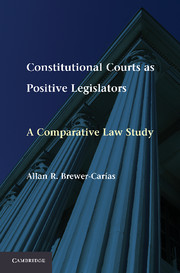Book contents
- Frontmatter
- Contents
- AUTHOR'S NOTE
- PART ONE CONSTITUTIONAL COURTS AS POSITIVE LEGISLATORS IN COMPARATIVE LAW
- CHAPTER 1 JUDICIAL REVIEW OF LEGISLATION AND THE LEGISLATOR
- CHAPTER 2 CONSTITUTIONAL COURTS' INTERFERENCE WITH THE CONSTITUENT POWER
- CHAPTER 3 CONSTITUTIONAL COURTS' INTERFERENCE WITH THE LEGISLATOR ON EXISTING LEGISLATION
- CHAPTER 4 CONSTITUTIONAL COURTS' INTERFERENCE WITH THE LEGISLATOR REGARDING LEGISLATIVE OMISSIONS
- CHAPTER 5 CONSTITUTIONAL COURTS AS LEGISLATORS ON MATTERS OF JUDICIAL REVIEW
- PART TWO NATIONAL REPORTS
- ARGENTINA
- AUSTRALIA
- AUSTRIA
- BELGIUM
- BRAZIL
- CANADA
- COLOMBIA
- COLOMBIA
- COSTA RICA
- CROATIA
- CZECH REPUBLIC
- FRANCE
- GERMANY
- BELGIUM, FRANCE, GERMANY
- GREECE
- HUNGARY
- INDIA
- ITALY
- MEXICO
- NETHERLANDS
- NORWAY
- POLAND
- PORTUGAL
- SERBIA
- SLOVAK REPUBLIC
- SWITZERLAND
- UNITED KINGDOM
- UNITED STATES OF AMERICA
- VENEZUELA
- PART THREE SYNTHESIS REPORT: CONSTITUTIONAL COURTS AS POSITIVE LEGISLATORS IN COMPARATIVE LAW
- APPENDIX
- INDEX
MEXICO
The Mexican Supreme Court as Positive Legislator
Published online by Cambridge University Press: 04 August 2017
- Frontmatter
- Contents
- AUTHOR'S NOTE
- PART ONE CONSTITUTIONAL COURTS AS POSITIVE LEGISLATORS IN COMPARATIVE LAW
- CHAPTER 1 JUDICIAL REVIEW OF LEGISLATION AND THE LEGISLATOR
- CHAPTER 2 CONSTITUTIONAL COURTS' INTERFERENCE WITH THE CONSTITUENT POWER
- CHAPTER 3 CONSTITUTIONAL COURTS' INTERFERENCE WITH THE LEGISLATOR ON EXISTING LEGISLATION
- CHAPTER 4 CONSTITUTIONAL COURTS' INTERFERENCE WITH THE LEGISLATOR REGARDING LEGISLATIVE OMISSIONS
- CHAPTER 5 CONSTITUTIONAL COURTS AS LEGISLATORS ON MATTERS OF JUDICIAL REVIEW
- PART TWO NATIONAL REPORTS
- ARGENTINA
- AUSTRALIA
- AUSTRIA
- BELGIUM
- BRAZIL
- CANADA
- COLOMBIA
- COLOMBIA
- COSTA RICA
- CROATIA
- CZECH REPUBLIC
- FRANCE
- GERMANY
- BELGIUM, FRANCE, GERMANY
- GREECE
- HUNGARY
- INDIA
- ITALY
- MEXICO
- NETHERLANDS
- NORWAY
- POLAND
- PORTUGAL
- SERBIA
- SLOVAK REPUBLIC
- SWITZERLAND
- UNITED KINGDOM
- UNITED STATES OF AMERICA
- VENEZUELA
- PART THREE SYNTHESIS REPORT: CONSTITUTIONAL COURTS AS POSITIVE LEGISLATORS IN COMPARATIVE LAW
- APPENDIX
- INDEX
Summary
INTRODUCTION
From a material point of view, the Mexican Supreme Court of Justice of the Nation (hereinafter, SC) has evolved from an appeals court into a constitutional court, specifically since the constitutional reform of December 31, 1994. From that date, its composition decreased from twenty-six to eleven Justices, and it was empowered to pronounce the invalidity of norms with future erga omnes effects through two mechanisms: the abstract unconstitutionality cause of action and constitutional controversies.
These powers are exclusive to the SC. As such, the best doctrine has considered it a real constitutional court, although it still presides over matters inherent to a legality court, as it is at the top of the federal judicial branch. Because of its dual duties (constitutional and legal), it has been deemed that the system controlling constitutionality in Mexico has a mixed nature, to the extent that it has European or centralized control features and some aspects of the diffuse or American system, as the SC also presides over amparo proceedings (on review), in which it may declare only the inapplicability of an unconstitutional norm to a specific case.
The full exercise of these constitutional powers has led the SC to evolve the type of decisions it issues. In this manner, it has left behind the conceptualization of the famous Viennese jurist Kelsen because it has ceased to be a simple negative legislator, having progressed to what may be considered a true positive legislator in line with certain evolving constitutional court trends.
- Type
- Chapter
- Information
- Constitutional Courts as Positive LegislatorsA Comparative Law Study, pp. 623 - 644Publisher: Cambridge University PressPrint publication year: 2011



